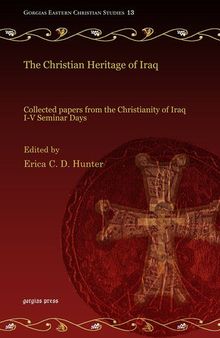 جزییات کتاب
جزییات کتاب
Iraq has been a centre of Syriac Christianity for almost two thousand years. From its beginnings in the second century CE until the twenty-first century, Christianity has had a significant religious profile in Iraq, variously enriching the culture of Mesopotamia from where its influence extended into adjacent and more distant regions. This volume of collected papers from the Christianity in Iraq I-V Seminar Days (2004-2008) explores the heritage and contribution of Syriac Christianity to Iraq, highlighting its innate ability to transcend barriers of language, culture, ethnicity and religion. Papers are organized into four major sections. The first probes exchanges with the Muslim world in the Ummayid and Abbasid era. The second section investigates the legacy of monasticism that continues, albeit tenaciously, to the present day. The remarkable outreach programme of The Church of the East in Central Asia that, amongst other things, introduced the Syriac Bible is the subject of the third section. Finally, the volume examines post-medieval responses following the ravages of the fourteenth century, which essentially confined Syriac Christianity to northern Mesopotamia. Growth and innovation are charted in various ways: in literary production as well as architecture. However, in the vernacular domain, traditional forms were maintained: particularly Neo-Aramaic dialects and the use of amulets. The entrepreneurial spirit also saw the establishment of private schools in the twentieth century; a remarkable response in view of the tragedies suffered by so many of the Christians. Today Christianity in Iraq is still confronted by many formidable challenges.



 دانلود کتاب
دانلود کتاب

 جزییات کتاب
جزییات کتاب





 این کتاب رو مطالعه کردید؟ نظر شما چیست؟
این کتاب رو مطالعه کردید؟ نظر شما چیست؟
